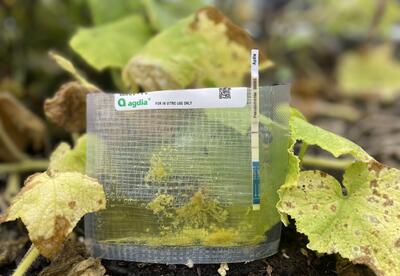
--- FOR IMMEDIATE RELEASE ---
Agdia, Inc. (Elkhart, IN) is happy to announce the commercialization of two rapid, DNA-based assays, on their AmplifyRP® XRT platform, for the detection and identification of Candidatus Phytoplasma solani bois noir and Candidatus Phytoplasma vitis Flavescence dorée.
Candidatus Phytoplasma solani causes a wide range of diseases on multiple crops throughout the world. The most economically important of these pathosystems include stolbur disease on several members of Solanaceae and bois noir (BN), or black wood disease on grapevine, Vitis vinifera. The impact of BN on vineyards in Europe and the eastern Mediterranean area is significant, capable of causing up to 100% crop loss. For this reason, the European Union has designated Ca. Phytoplasma solani a harmful organism of regulatory concern, prompting restrictions on the import of solanaceous plants.
Bois noir disease on grapevines was first reported in 1961 in northern France. At that time, it was believed the causal agent was a closely related pathogen, Ca. Phytoplasma vitis, which causes a disease known as Flavescence dorée (FD), or yellowing on grapevines. Symptomology of BN and FD infections is indistinguishable in the field, and collectively they are referred to as grapevine yellows disease. Subsequently, BN was determined to be caused by the previously uncharacterized Ca. Phytoplasma solani. Symptoms of grapevine yellows include desiccation of inflorescences, berry shrivel, leaf discoloration, reduction of growth, blackening of wood and irregular ripening of wood. Severity of symptoms is dependent on variety and environmental conditions; however, all cultivated varieties are susceptible.
Flavescence dorée disease was first observed in the 1950’s, causing epidemics in French vineyards. Like BN, FD has spread to all grape-producing regions in Europe and represents a significant threat to viticulture worldwide. The host range of Ca. Phytoplasma vitis is restricted to cultivated grapevine and wild relatives. This organism is of quarantine status in the European Union.
Both phytoplasmas are transmitted locally in a persistent propagative manner by phloem-feeding planthoppers in the family Cixiidae (Order Hemiptera). Hyalesthes obsoletus transmits Ca. Phytoplasma solani while Scaphoideus titanus transmits Ca. Phytoplasma vitis. Both vectors have highly evolved, unique biological relationships with their respective phytoplasmas, and there is no evidence to suggest that either insect can transmit both pathogens. Both pathogens are graft-transmissible, and infected propagative materials are the vehicles of long-distance dissemination. Young plants, such as those used in vineyard establishment, can be latently infected and asymptomatic. This dissemination paradigm, in conjunction with an extended latency period, makes the diagnostic testing of planting materials paramount to successful management of grapevine yellows disease and the causal organisms.
Agdia’s new AmplifyRP® XRT assays are based on recombinase polymerase amplification (RPA). This technology promotes the rapid amplification and detection of nucleic acid targets, DNA or RNA, while maintaining a single operating temperature of 39o– 42o C. When paired with Agdia’s AmpliFire® isothermal fluorometer, the XRT system is a rapid, user-friendly tool that can be implemented in the field or the lab by personnel with limited experience in molecular diagnostics. To perform the assay, the end-user initially extracts their sample using a mesh extraction bag and buffer. After the sample has been extracted, a small volume of sample is added to a solution that is used to rehydrate a lyophilized reaction pellet. Once the reaction pellet has been rehydrated, it is added to a portable fluorometer and heated at 42o C for 20 minutes. During this time, the target phytoplasma DNA, if present, will be amplified and produce a fluorescent signal that is detected by the fluorometer in real time and visualized as an amplification curve.
Agdia states their new assays are specific to proposed phytoplasma species and no cross-reactivity was observed between Candidatus Phytoplasma solani and Candidatus Phytoplasma vitis. Moreover, Agdia states both assays are comparable in sensitivity to the accepted qPCR assays used for identification of these proposed phytoplasma species. The AmplifyRP® XRT assays were designed for use with cane and petiole tissue.
The introduction of these products brings Agdia’s catalog to 16 assays on the AmplifyRP® platform. High levels of market demand for field-deployable, plant pathogen detection products have driven this output, and Agdia maintains they will continue to expand their product offerings. For more information on Agdia’s complete line of AmplifyRP® assays, please visit Agdia’s website www.agdia.com.
About Agdia
A leading provider of diagnostic solutions for agriculture, Agdia, Inc. has been serving plant breeders, propagators, growers, universities, regulatory organizations and private testing laboratories since 1981. The company offers a comprehensive portfolio of validated, easy-to-use diagnostics for identifying plant pathogens, plant hormones, and transgenic traits. Moreover, Agdia operates an ISO accredited, in-house, testing services laboratory. Agdia’s quality management system is ISO 9001:2015 certified and their Testing Services Laboratory is ISO 17025:2017 accredited. Visit the company’s website at www.agdia.com, e-mail info@agdia.com, phone 1-574-264-2615 (toll-free 800-622-4342) or fax 1-574-264-2153.
About AmplifyRP®
AmplifyRP® XRT and AmplifyRP® Acceler8® test kits employ recombinase polymerase amplification (RPA) technology licensed by Agdia, Inc (licensee) from TwistDx Limited, U.K (licensor). Use of the RPA process and probe technologies are protected by US patents 7,270,981 B2, 7,399,590 B2, 7,435,561 B2, 7,485,428 B2 and foreign equivalents in addition to pending patents.
AmplifyRP® and AmpliFire® are registered trademarks of Agdia, Inc.
###





